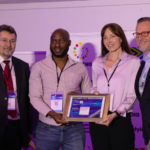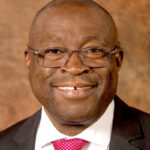Mabel Sikhakhane, head of department (HOD) of the foundation phase at Nokuphila Primary School, elaborates on some of the many hats she and the teachers at Nokuphila have to wear in order to better serve their learners and the community at large.
Besides her duties as HOD for grades 1 through 3, Sikhakhane is also the chairperson of Nokuphila’s School-Based Support (SBS) team. She also founded the Radisela Aftercare and Drop-in-centre in her local community. In her role as chairperson of the SBS team, she is personally involved in the solution process when it comes to assisting learners to overcome learning barriers, which range from academic acuity, domestic issues, health, and other psycho-social challenges. The School-Based Support Team consists of a counsellor (Sikhakhane), a social worker, the school’s qualified remedial teachers and a therapist. Teachers with learners who are battling with learning barriers reach out to the SBS team who then come up with strategies and advise teachers on what to do, be it food parcels for the child to take home or adopting a new teaching method as not all children learn the same way. Should they reach the limit of what they can do to assist, for example, if the child has a learning disability that Nokuphila isn’t geared to support, they entrust the case to the district office who will make sure that the learner is placed in a school that specialises in the field so the child benefits from an education catering to their special needs.
Sikhakhane is also a mentor for student teachers at Nokuphila who come to complete their teaching practice as part of their degrees. Whereas the universities speak to the theories, Sikhakhane is responsible for teaching them the correct attitudes, behaviours, and values as they will be role models for their students. This is extremely important as learners mimic behaviour – good and bad. By setting good examples for their students and by helping the children truly grasp the lesson content they have an impact on their households as well. A good example would be the amount of effort that teachers spend teaching the children about Covid-19 and the new rules about hygiene they need to follow. By understanding why they need to behave differently, at home and school, the learners become role models for their family members and share what they’ve learnt about Covid-19.
The teachers also ran workshops for the parents regarding the Coronavirus which had a massive impact, especially during a period with so much misunderstanding and misinformation going around. But, before they could counsel others the teachers required psychosocial support themselves to be better equipped to offer support to parents and learners traumatised by the pandemic. This clearly illustrates that teachers don’t just cater to the children’s academic needs but also play a large role in the child’s spiritual, emotional and physical well-being. And as community leaders.
Outside of her work at Nokuphila, Sikhakhane is the founder of the Radisela Aftercare and Drop-in-centre where orphans, children from child-headed families and children raised by their elderly grandparents can come after school to get supper and have their school uniforms cleaned and prepared for the following day. They conduct home visits to investigate the child’s home situation, especially if there is suspected abuse which they then report and take up with the law. They also established a women’s group to help bereaved families with the funeral costs as these are culturally very meaningful and can be extremely costly.
When asked how she measures the success of all her hard work Mabel says, that she looks at how the learner performs academically as well as the impact on a child’s situation at home, especially the change in parents’ perception of school and their involvement participate in their child’s education – “Changing the parents means you will change the community and society at large.”
About The Love Trust
Our purpose
– Founded in 2009, we are a South African non-profit organisation (NPO) with a vision to nurture future generations of servant leaders
– Providing vulnerable children with quality education and social care that includes academic excellence, spiritual strength and moral integrity
What we do
– We impact children’s education through the teacher
– As an education provider we play our part towards South Africa achieving its commitment to the UN Sustainable Development Goal 4 that by 2030 all girls and boys have access to quality early childhood education, development and care. We do this by i) by providing quality primary school education and care at our Nokuphila pre-primary and primary school; ii) we provide vocational tertiary education and training of teachers, specifically early childhood education practitioners and primary school teachers
– We strive to reduce poverty and social inequality through holistic education and care of primary and pre-primary children, including nutrition, psycho-social and remedial support
– We empower black women to qualify as teachers and equip them to be leaders in their communities












